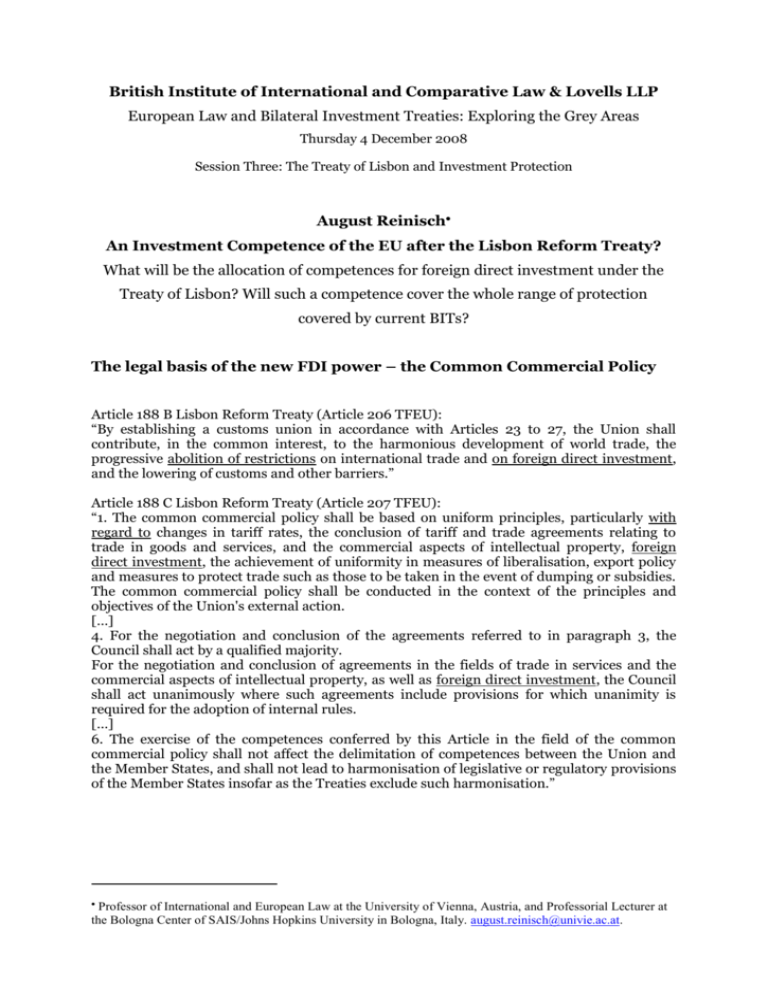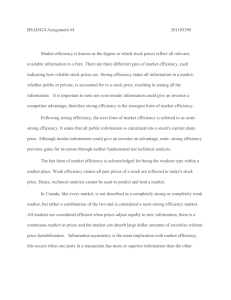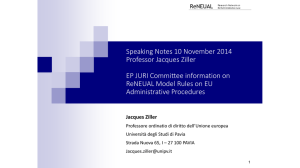Investment Competence of the EU
advertisement

British Institute of International and Comparative Law & Lovells LLP European Law and Bilateral Investment Treaties: Exploring the Grey Areas Thursday 4 December 2008 Session Three: The Treaty of Lisbon and Investment Protection August Reinisch An Investment Competence of the EU after the Lisbon Reform Treaty? What will be the allocation of competences for foreign direct investment under the Treaty of Lisbon? Will such a competence cover the whole range of protection covered by current BITs? The legal basis of the new FDI power – the Common Commercial Policy Article 188 B Lisbon Reform Treaty (Article 206 TFEU): “By establishing a customs union in accordance with Articles 23 to 27, the Union shall contribute, in the common interest, to the harmonious development of world trade, the progressive abolition of restrictions on international trade and on foreign direct investment, and the lowering of customs and other barriers.” Article 188 C Lisbon Reform Treaty (Article 207 TFEU): “1. The common commercial policy shall be based on uniform principles, particularly with regard to changes in tariff rates, the conclusion of tariff and trade agreements relating to trade in goods and services, and the commercial aspects of intellectual property, foreign direct investment, the achievement of uniformity in measures of liberalisation, export policy and measures to protect trade such as those to be taken in the event of dumping or subsidies. The common commercial policy shall be conducted in the context of the principles and objectives of the Union's external action. […] 4. For the negotiation and conclusion of the agreements referred to in paragraph 3, the Council shall act by a qualified majority. For the negotiation and conclusion of agreements in the fields of trade in services and the commercial aspects of intellectual property, as well as foreign direct investment, the Council shall act unanimously where such agreements include provisions for which unanimity is required for the adoption of internal rules. […] 6. The exercise of the competences conferred by this Article in the field of the common commercial policy shall not affect the delimitation of competences between the Union and the Member States, and shall not lead to harmonisation of legislative or regulatory provisions of the Member States insofar as the Treaties exclude such harmonisation.” Professor of International and European Law at the University of Vienna, Austria, and Professorial Lecturer at the Bologna Center of SAIS/Johns Hopkins University in Bologna, Italy. august.reinisch@univie.ac.at. A) Scope of the new FDI competence: Literally, the new investment competence is limited to FDI to the exclusion of portfolio and other broader notions of investment covered by most BITs and IIAs. The term “FDI” is not defined in the Lisbon Treaty, but the term “direct investment” appears already in Article 57(1) TEC as well as Annex I of Council Directive 88/361/EEC, referring to IMF and OECD definitions of FDI: IMF Manual: “362. Reflecting the difference noted previously, a direct investment enterprise is defined in this Manual as an incorporated or unincorporated enterprise in which a direct investor, who is resident in another economy, owns 10 percent or more of the ordinary shares or voting power (for an incorporated enterprise) or the equivalent (for an unincorporated enterprise). Direct investment enterprises comprise those entities that are subsidiaries (a nonresident investor owns more than 50 percent), associates (an investor own 50 percent or less) and branches (wholly or jointly owned unincorporated enterprises) either directly or indirectly owned by the direct investor. […].”1 OECD Benchmark Definition: “11. Direct investment is a category of cross-border investment made by a resident in one economy (the direct investor) with the objective of establishing a lasting interest in an enterprise (the direct investment enterprise) that is resident in an economy other than that of the direct investor. The motivation of the direct investor is a strategic long-term relationship with the direct investment enterprise to ensure a significant degree of influence by the direct investor in the management of the direct investment enterprise. The “lasting interest” is evidenced when the direct investor owns at least 10% of the voting power of the direct investment enterprise. Direct investment may also allow the direct investor to gain access to the economy of the direct investment enterprise which it might otherwise be unable to do. The objectives of direct investment are different from those of portfolio investment whereby investors do not generally expect to influence the management of the enterprise.”2 Does the regulation of FDI only make practical sense? – Maybe, if limited to market access negotiations as conducted in the WTO framework.3 See 2002 EC Communication: “Should a direct investor control the company with less than 10 per cent of the ordinary shares the following criteria could be taken into account to determine whether a direct investment relationship exists: (a) representation in the Board of Directors; (b) participation in policy-making processes; (c) inter-company transactions; (d) interchange of managerial personnel; (e) provision of technical information; (f) provision of long-term loans at lower than existing market rates.”4 Otherwise, need to conclude mixed agreements. International Monetary Fund, Balance of Payments Manual, fifth edition, 1993, para. 362, available at http://www.imf.org/external/np/sta/bop/BOPman.pdf. 2 OECD Benchmark Definition of Foreign Direct Investment, 4 th edition, April 2008, para. 11, available at http://www.oecd.org/dataoecd/26/50/40193734.pdf. 3 According to the Doha Ministerial Conference the “Working Group on the Relationship Between Trade and Investment will focus on the clarification of: scope and definition; transparency; nondiscrimination; modalities for pre-establishment commitments based on a GATS-type, positive list approach; development provisions; exceptions and balance-of-payments safeguards; consultation and the settlement of disputes between members. […].” Doha Ministerial Declaration, para. 22, adopted on 14 November 2001, WT/MIN(01)/DEC/1, 20 November 2001, available at http://www.wto.org/english/thewto_e/minist_e/min01_e/mindecl_e.htm. 4 Communication from the European Community and its Member States to the Working Group on the Relationship between Trade and Investment: “Concept paper on the definition of investment”, WT/WGTI/W/115, 16 April 2002, 4. 1 B) Only market access/admission/establishment or all aspects currently covered by BITs? 1) All aspects currently covered by BITs Broad wording: Article 207(4) TFEU refers to the “negotiation and conclusion of agreements in the fields of trade in services and the commercial aspects of intellectual property, as well as foreign direct investment,” not only agreements relating to the commercial aspects of FDI. Similarly, according to Article 207(4) TFEU the “common commercial policy shall be based on uniform principles, particularly with regard to changes in tariff rates, the conclusion of tariff and trade agreements relating to trade in goods and services, and the commercial aspects of intellectual property, foreign direct investment, […].” Thus, CCP relates not only to trade agreements, as far as FDI is concerned it merely needs to be “based on uniform principles”. Policy arguments: Strong role of the EU (more negotiating power than individual Member States); Unified (“uniform principles”) vs. fragmented investment treaty regime 2) Only market access/admission/establishment: The new FDI competence is part of the CCP policy as described in Article 206 Treaty on the Functioning of the European Union: “[…] progressive abolition of restrictions on international trade and on foreign direct investment, […]” The abolition of restrictions concerns market access and thus the pre-investment or establishment phase, not post-establishment or treatment. Only market access barriers “restrict” FDI, thus only their abolition will be required under the expanded CCP. BUT also level of protection of existing investments will increase FDI (favourable investment climate argument) Original rationale: to provide the EU with the power to negotiate a WTO agreement on investment?







